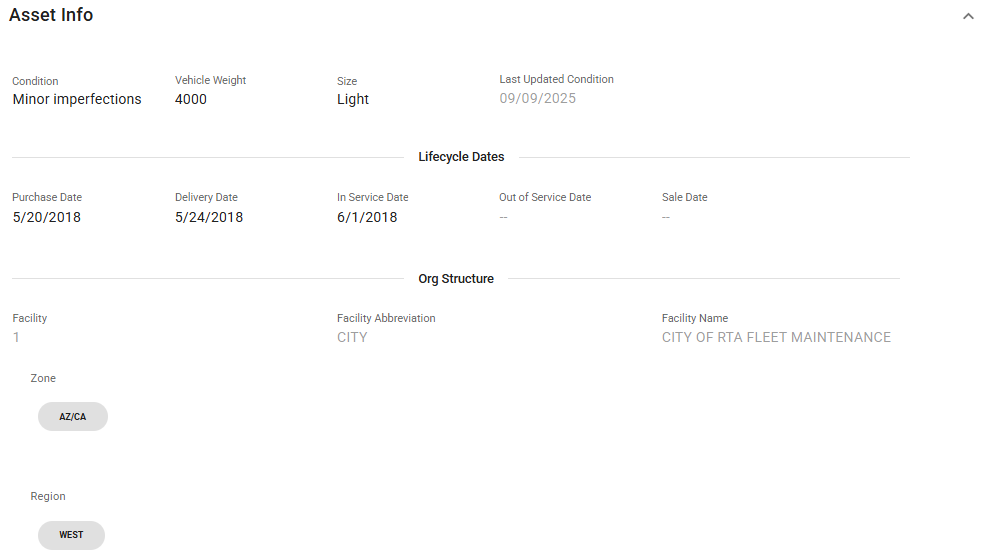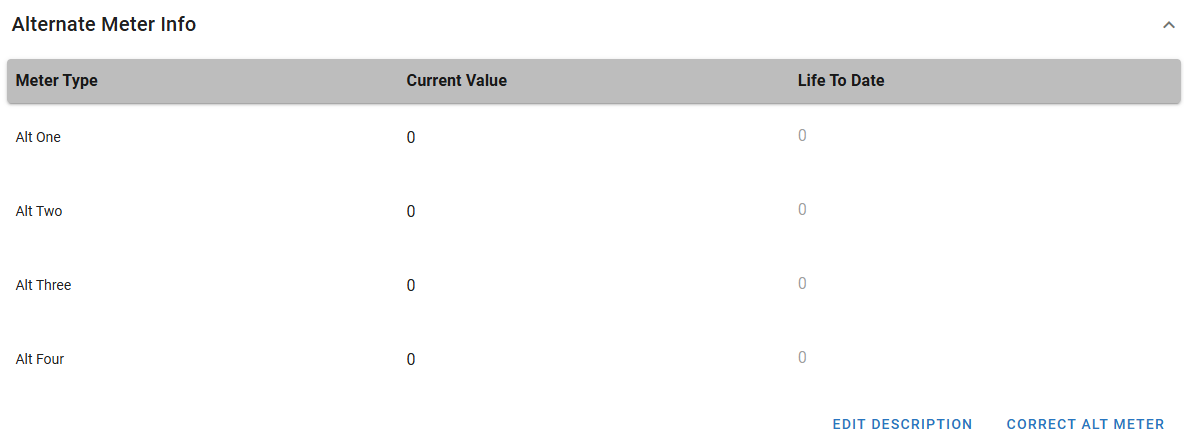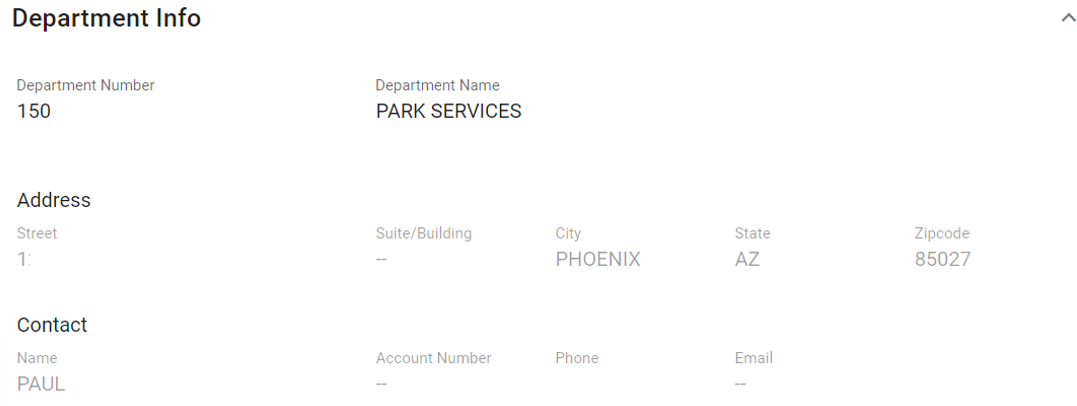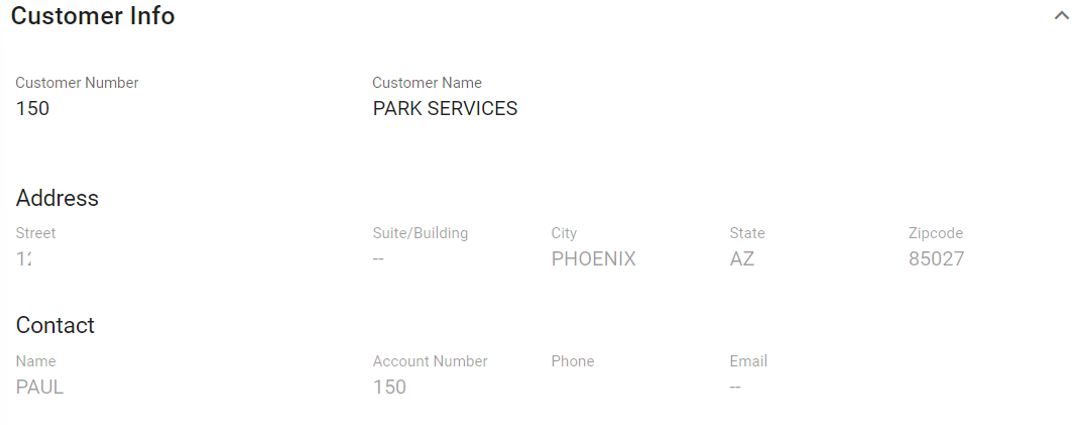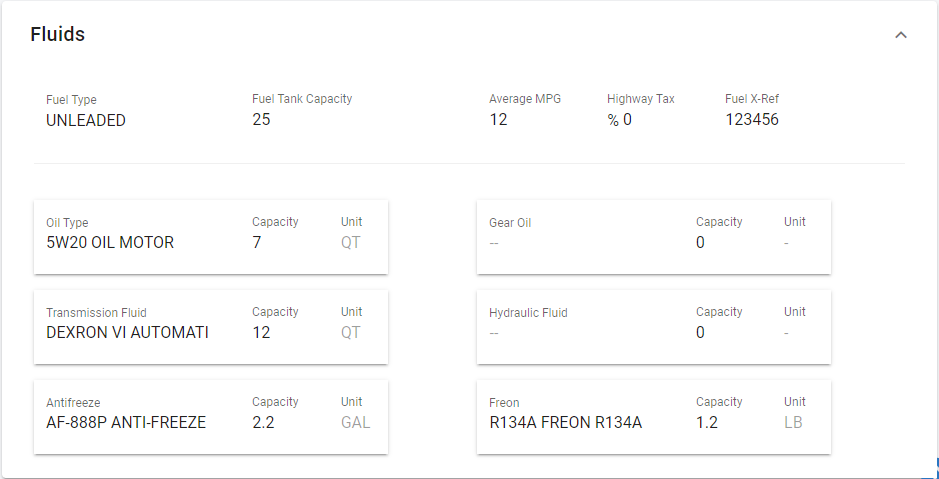
Asset Management Tab
The Asset Management Tab holds multiple panels all designed to hold pertinent information pertaining to your asset. This article will cover all the panels and fields found in the asset management tab.
You can visit Asset File Table of Contents to access the full list of articles related to Displayed Asset Data in RTA.
🔓 Denotes fields that are editable within RTA software
Asset Info Panel
This panel is designated for adding additional information regarding the asset. While these fields are optional, RTA does recommend leveraging them. Below you will find the various panels and fields found in the Asset Info panel along with explanations for and how to use them.
🔓 Condition – This field is related to the current condition of the asset
Edit by clicking in the field and choosing the appropriate status from the available option
🔓 Vehicle Weight - This field is designed enter how much the asset weights
🔓 Size – Click in the field and select the appropriate asset size (light, medium, heavy, etc.)
These tie into difficulty factors which help determine the estimated time that will be used as a guideline for technicians to complete a job
If technician productivity will not be tracked, then there is no need to be concerned with the difficulty levels
Refer to Mechanic Productivity for more information on technician productivity and difficulty factor set up
Last Updated Condition – This field displays the date for the last update to the condition field
Lifecycle Dates
🔓 Purchase Date – Click the field and enter the date when the asset was purchased
🔓 Deliver Date - Click the field to enter the date when the asset was delivered to the organization
🔓 In Service Date – Click the field to enter the date the asset officially went into service
🔓 Out of Service Date - Click the field to enter the date the asset was retired
🔓 Sale Date - Click the field to enter the date the asset was sold
Org Structure
Facility - Defaults to the facility number where the asset is assigned.
Facility Abbreviation - Defaults to the abbreviation of the facility where the asset is assigned
Facility Name - Defaults to the name of the facility where the asset is assigned
Zone - Defaults to the zone assignment information
Region - Defaults to the region assignment information
Primary Meter Info Panel
This panel is designated for meter information.
🔓 Meter Type – Click in the field and select the appropriate type for this asset (Hours, Miles, Gallons, etc.)
🔓 Odometer – Click in the field and enter the current odometer reading for the asset
Refer to Meter Readings for instructions on correcting odometer readings.
Fuel Meter and Life Meter – These fields are automatically updated by the RTA system; no entry can be made in these fields
They will reflect as the current meter reading initially
Fuel meter will show the meter reading from the last fuel-up
Life meter will show the units traveled by the asset over time
Alternate Meter Info Panel
This panel is designated for alternate meter information.
Alternate Meter Types must be set up in advance before being able to pull them into the asset file. Refer to Alt Meter Settings for information.
Alt One, Two, Three, Four – Click on Edit Description and select from the available meters in the alternate meter type to be tracked (for example HOURS) and then click Done. The field under the header can have its value edited to reflect the current reading for that meter.
Up to four alternate meters can be added to a asset
May be another meter such as an engine or component hour meter or it may represent items transported by this asset such as passengers, cases, boxes, tons, yards, or pallets
Current Value - This field displays the current meter reading for that alternate meter type
Life To Date - This field displays the life meter reading for that alternate meter
Refer to Meter Readings and Corrections for instructions on how to correct alternate meter readings.
Department Info Panel
Departments are a way of separating asset cost within a facility.
Refer to Departments for instructions on adding departments
🔓 Department Number – Click in the field and select the appropriate department in which this asset belongs and click the check mark
🔓 Department Name – Click in the field and select the appropriate department name and click the check mark
Department Number and Department Name are linked. When you change one, the field for the other adjusts to reflect the corresponding data
Address – Fields populate based on the address information listed in the Department File on RTA Classic for the specific department assigned
Contact – Fields populate based on the contact information listed in the Department File on RTA Classic for the specific department
Vehicle Warranties Panel
Warranty tracking is an essential component of saving costs to the shop. The warranty panel allows the tracking of bumper to bumper and extended warranties for assets.
Need to set up an asset bumper to bumper or extended warranty? Refer to Asset Warranty Set Up for more information.
Customer Info Panel
Customers are typically used as designated cost centers.
Refer to Customers for instructions on adding departments
🔓 Customer Number - Click in the field and select the appropriate customer in which this asset belongs and click the check mark
🔓 Customer Name – Click in the field and select the appropriate customer’s name and click the check mark
Customer Number and Customer Name are linked. When you change one, the field for the other adjusts to reflect the corresponding data
Address – Fields populate based on the address information listed in the Customer File on RTA Classic for the specific customer assigned
Contact – Fields populate based on the contact information listed in the Customer File on RTA Classic for the specific customer
Asset Notes Panel
This panel will allow a user to add and review asset notes. Click in the panel and start typing. Notes will remain until they are deleted.
Fluids Panel
Most fields in the Fluids Panel are editable within RTA software.
The “Unit” fields that are not editable in the asset File and are driven by the “Unit of Issue” value associated with the added part on the part record. If there is no part or no unit associated with the part file, then it will default to QT. Refer to Parts Inventory Tab for more information on Unit of Issue.
Editing fields will require the user to click in the field, select the appropriate value, and click the check mark to save the added value.
🔓 Fuel Fields
Fuel Type – Select the fuel type used by this asset or the primary fuel type if the asset can use multiple types of fuel
RTA comes with 9 pre-defined fuel types to select from. If more are needed for use, they will need to be created in the Fuel Settings section. Refer to Fuel - Settings: for adding or editing Fuel Types
Fuel Tank Capacity – Enter the maximum fuel quantity this asset can hold
Average MPG – Enter the estimated miles per gallon for this asset
Highway Tax % - Enter the highway tax rate for this asset if applicable
Fuel X-Ref - This field is typically what ties an external fuel system to your asset via a fuel card number if it does not match the RTA Asset Number
The remaining fields include the fluid type and the capacity for this asset. The fluid types that are available for input are driven by parts added to the RTA platform. Refer to Adding a Part for adding parts if the appropriate part is not available in the drop down.
🔓 Oil Fields
Select the appropriate part type
Enter the quantity of oil for the asset
🔓 Gear Oil Fields
Select the appropriate part type
Enter the quantity of oil for the asset
🔓 Transmission Fluid Fields
Select the appropriate part type
Enter the quantity of transmission fluid for the asset
🔓 Hydraulic Fluid Fields
Select the appropriate part type
Enter the quantity of hydraulic fluid for the asset
🔓 Antifreeze Fluid Fields
Select the appropriate part type
Enter the quantity of antifreeze for the asset
🔓 Freon Fluid Fields
Select the appropriate part type
Enter the quantity of freon for the asset
